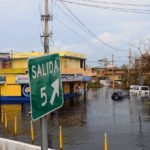
President Trump bristled at criticism of his administration’s slow response to the disaster that Hurricane Maria inflicted on Puerto Rico, lashing out on Twitter against San Juan’s frontline mayor, report Dennis J Bernstein and Randy Credico.
Special Report: The Russia-gate hysteria now routinely includes rhetoric about the U.S. being at “war” with nuclear-armed Russia, but the shaky factual foundation continues to show more cracks, as historian Daniel Herman describes.
President Trump has used the three iterations of his “travel ban” as a dog whistle to his “base,” which he thinks harbors hatred toward Muslims, but there is no logic behind the policy, as ex-CIA analyst Paul R. Pillar observes.
Some of our special stories in August focused on Official Washington’s growing hostility toward dissent, the Trump administration’s drift toward more endless warfare, and the worsening crises in Korea and Mideast.